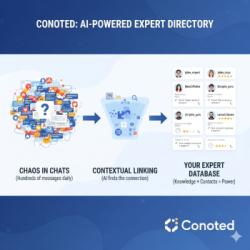
Contextual Linking: How We Turn Telegram Chaos into a Graph of Experts
We live in the era of "Information Obesity." Especially in Telegram.You subscribe to a channel to stay updated. Then you join the chat group to see what people think. But within hours, the useful insight is buried under 500+ messages of flood, memes, and off-topic discussions.We usually solve this by either muting the chat (and missing out) or trying to read everything (and burning out).At Conoted, we realized that the value isn't just in the news itself. The value is in the context surrounding...
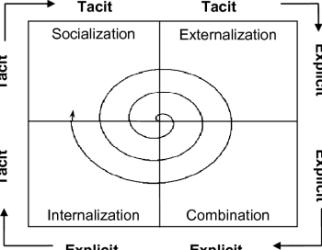
Polako and New Horizons: The SECI Model and How Knowledge Is Born in Communication
The main thing that changed everything was the local "polako" mentality. It's their word for "calm," "take your time," "polako." No one rushes anywhere here. Coffee and rakia (a local alcoholic drink, 40 grams) are drunk from 6 a.m., work is not rushed, life is enjoyable. In Russia, I was constantly stressed, but here – mountains, sea, silence. Gradually, "polako" began to permeate me. The tension eased, my thoughts cleared. I was finally able to sit down and actually start working on Conoted...
My Anchor in Chaos: Discovering the Zettelkasten Method
Continuing the story from my previous post—after leaving Russia, I promised to share how I found a small lifeline even in the darkest days. In Russia, I became fascinated with Zettelkasten—I read books, articles, and videos. I tried Notion and Obsidian, but they seemed too complicated. Apple Notes and Google Keep helped, but they lacked functionality. I analyzed the market and couldn't find the perfect solution—that's where the idea for Conoted came from. But it was born in Montenegro; bef...
Starting with a Clean Slate: Why I Left Russia and How a New Life Began
It's been a long time since I last wrote here, and I've decided to start with a clean slate. From now on, this blog will be about my emigration, my deepest feelings, why I had to leave, how my new life unfolded in Montenegro, why I got obsessed with Zettelkasten, and many other raw parts of my story.I always knew deep down that I would leave Russia one day - but I never imagined it would be because of the war.Let's begin.Why I Left Russia: The War and My Inner ConflictThe roots go back to 2014 -...
Analytics for Users in Conoted: What is Important and Why It is Needed
In Conoted, ordinary users are subscribers to Telegram channels and participants in Telegram/ WhatApp groups who use the app to structure information. They are not owners, but consumers of content, so analytics here focuses not on monetization or audience growth, but on personalizing the experience: helping to find valuable content, understand trends, and connect with interesting people. We draw on 2025 trends, where messaging app users (according to Pew Research) spend hours filtering informati...
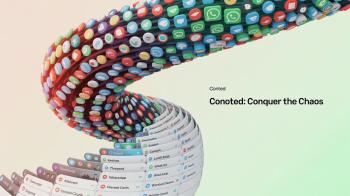
Telegram and WhatsApp - Chaos of Information. Conoted Turns the Stream into Structure
In the era of digital overload, Telegram and WhatsApp have emerged as two of the most popular messaging platforms: billions of users, hundreds of thousands of channels and groups on Telegram, and countless chats on WhatsApp, where a relentless stream of messages, posts, comments, and links flows daily. While both offer convenience, they hide a significant challenge - chaos. Information is scattered, topics overlap, and valuable insights get buried in the noise. How do you navigate this whir...
Daily Conoted Gazette: Your Personalized Roundup for July 17, 2025
Good morning! Here's your personalized daily gazette, powered by Conoted—your smart knowledge hub. We've compiled insights from your selected sources in the "Productivity & Business" group, pulling together posts, summaries, and engagement from all linked Telegram channels and groups from yesterday (12:01 AM to 12:00 AM). This streamlined format lets you catch up on key highlights without scrolling through endless feeds. Dive in for quick, actionable intel!Channel 1: @ProductivityHacks (Tele...
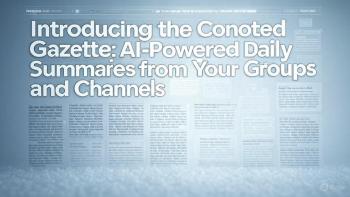
Introducing the Conoted Gazette: AI-Powered Daily Summaries from Your Groups and Channels
In the age of group chats and social platforms, conversations move fast. Valuable ideas can easily get lost in a flood of messages. Conoted’s vision is to capture every idea – “all your posts automatically become notes; communicate, no idea can be lost”. To help users keep up, Conoted proposes a daily “Gazette”: a newspaper-style digest of the day’s discussions. An AI-powered bot (using ChatGPT or similar) would collect a full day of messages across chats, condense them into a concise summary, a...

Harnessing Collective Intelligence: A Unified Platform for Real-Time Idea Aggregation Across Messengers
IntroductionIn today's hyper-connected world, teams and communities across platforms like Telegram, WhatsApp, Discord, and Slack generate a wealth of ideas daily. However, these ideas often remain siloed within individual chats, limiting their potential to spark innovation or collaboration. What if there was a platform, like an advanced version of Conoted, that could collect, structure, and connect ideas in real-time from multiple messaging apps? Such a platform could enable collective intellige...

Unified Collective Intelligence: Real-Time Knowledge from Telegram, WhatsApp, Discord, and Slack
In today's hyper-connected world, valuable information is exchanged across countless chat groups on platforms like Telegram, WhatsApp, Discord, and Slack. However, these conversations often remain siloed, with insights in one community failing to reach others. It's common for multiple groups to discuss the same topics in parallel without knowledge of each other, meaning a brilliant idea shared in a Telegram channel might never surface in a Slack workspace dealing with the same issue. This fragme...
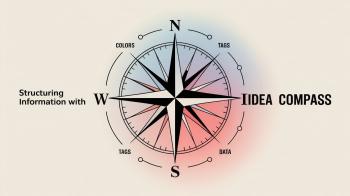
Structuring Information with Tags, Parent Tags, Idea Compass, and Colors
In note-taking applications like Conoted, organizing vast amounts of information efficiently is critical for productivity and clarity. Tags, parent tags, the Idea Compass methodology, and color coding offer a robust framework for structuring notes, especially in collaborative environments with multiple groups. This article explores how to combine these elements to create an intuitive, scalable, and visually appealing system for managing information in Conoted, while addressing the potential for...
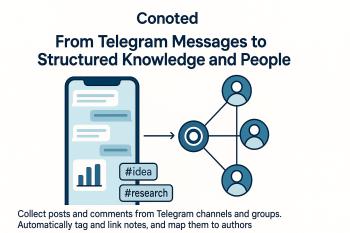
From Telegram Groups to a Knowledge Graph: Structuring Messages and People
The Challenge of Unstructured Chat DataTelegram channels and group chats (and similarly WhatsApp groups or Facebook groups) are rich in content – ideas, discussions, and contacts – but they suffer from a lack of structure. Valuable messages often get buried in the flow of conversation, and important insights or questions remain unorganized. As a result, messages get lost in the stream, important ideas remain scattered, interested contacts are hard to track, and it’s nearly impossible to quickly...
Expanding Telegram Channel Audiences with Conoted: An Interdisciplinary Approach
Conoted offers a unique opportunity for Telegram channel owners to expand their audience by integrating users from diverse sources into a structured knowledge base. This process begins with connecting a channel, transforming it into a group, and gradually growing through interdisciplinary connections and user additions. Let’s explore how this works and how channel owners can leverage Conoted to grow their active audience.How Audience Expansion Works Through Tags and IntersectionsWhen a channel o...
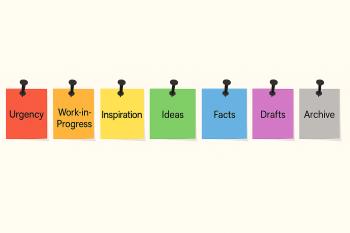
🎨 How to Use Colors in Conoted: A Practical Guide
Conoted lets you assign one of seven colors to any note — and these colors aren’t just cosmetic. They’re a simple, powerful way to organize, prioritize, and quickly navigate your ideas. Whether you’re sorting through your main feed or focused inside a specific group, colors help you visually structure your knowledge.Let’s explore how to use them.🔍 Where Colors Work in ConotedYou can add a color to any note — either right when you create it, or later. Colors are visible everywhere: In your m...

The problem of creating quick notes and their unstructured accumulation
In the world of modern note-taking apps, users often find themselves drowning in a sea of quick notes, random thoughts, and disconnected fragments. Tools like Obsidian, Notion, Apple Notes, Logseq, and Evernote offer powerful environments for capturing ideas - but they often fall short when it comes to organizing them in a meaningful, sustainable way.Let’s look at the root of the problem and how Conoted is approaching it differently — by enforcing structure from the very first moment.🧠 The "San...
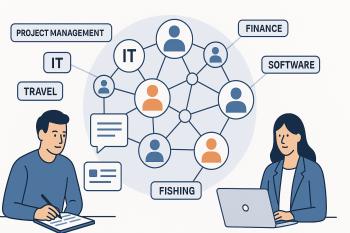
How Conoted Turns Notes into a Tool for Building Professional Communities and Finding Like-Minded People
Key Takeaways Conoted is more than a note-taking app—it's an ecosystem that uses notes as an entry point to create social graphs based on interests and expertise. The platform automatically tags users based on their notes, connecting like-minded individuals for personal or professional goals, such as collaborative projects or hobbies. In large companies, Conoted helps leaders form teams perfectly suited to tasks by analyzing employees’ interests and skills. In communities, Conoted connects p...
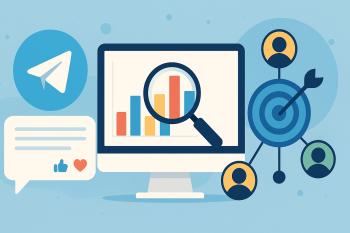
Telegram channel: deep analytics and careful selection of audience, targeting and engagement
In the era of information noise, Telegram channels have become a powerful tool for communication, promotion and knowledge sharing. However, many channel administrators face a problem: how to organize the flow of information and better understand their audience? In this article, we will tell you how to use the Conoted application to create a structured knowledge base and contacts from a Telegram channel, automatically tag subscribers by their interests and why this is beneficial for att...
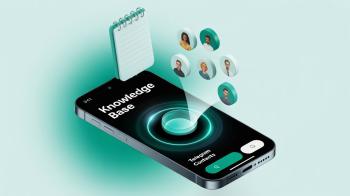
How to Create a Knowledge Base and Contacts from a Telegram Channel with Conoted
With nearly 1 billion users, Telegram channels are one of the most widely used tools for communicating, sharing information, and engaging with your audience.However, Telegram’s chaotic nature – a multitude of messages, comments, and threads – often results in valuable information and contacts being lost.Conoted, a note-taking and collaborative knowledge management app, offers a solution: integrating with Telegram to automatically collect messages and contacts, turning them into an organized know...
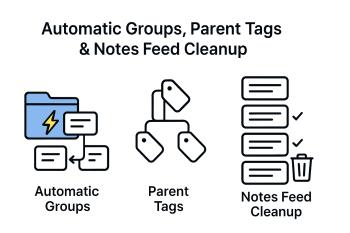
Automatic groups, parent tags, and notes feed cleaning
Managing a large number of notes can be a daunting task. The chaotic flow of ideas, tasks, and notes requires effective tools for organization.Automatic groups, automatic parent tags, and notes feed cleaning are three key approaches that help keep your digital workspace tidy.In this article, we will discuss how these features work, their benefits, and potential limitations.What are automatic groups?Automatic groups are a feature that allows the system to analyze notes, find those that have commo...
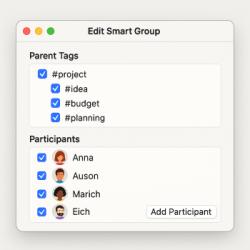
Smart Groups
Conoted is more than just a note-taking app, it is a platform that helps organize ideas, projects, and teamwork. One of the key features of Conoted is the use of groups to structure notes and automate processes. Groups in Conoted act as both personal folders for organizing notes and as a space for collaborating with a team or interest group. With an advanced tagging and filtering system, Conoted allows you to automatically collect notes and participants, simplifying information management. In th...